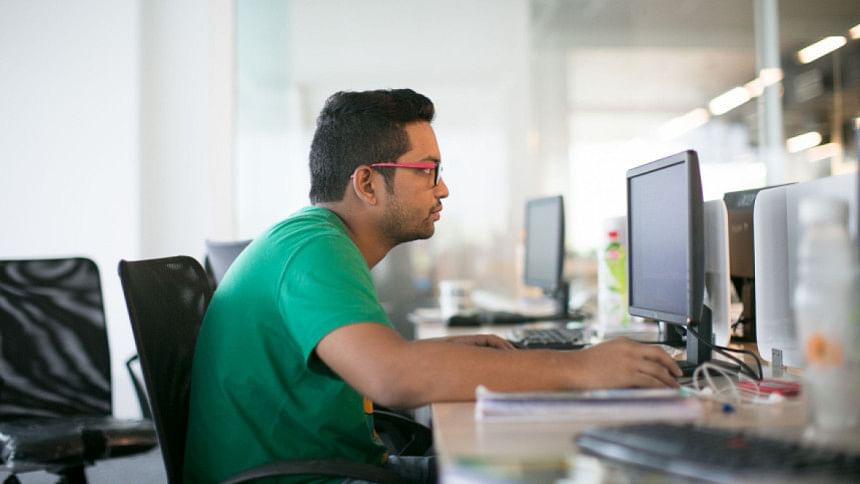Do longer working hours raise productivity?

Among the population of around 168.1 million in Bangladesh, 90 million are the inexpensive labour force. Some 60 million work in agricultural jobs and 30 per cent work in non-agricultural jobs. But do the labour force get the benefits in the areas of working hours, salary, leave, health policies and condition of employment they are supposed to receive as per labour laws?
According to the 2006 Labour Act of Bangladesh, the working hour for all levels of employees and workers should be eight hours per day plus up to two hours of overtime work. The weekly working time is limited to 48 hours and the overtime may lift it to 60 hours. The International Labour Organisation (ILO) has also suggested keeping normal working hours to eight hours per day and 48 hours per week in general.
In Bangladesh, employees and workers have to work on their weekends too. They do this extra hour job because no one wants to lose their job and some want a promotion.
OVERWORKING AROUND THE WORLD
According to a joint report of the World Health Organisation and the ILO in 2021, 488 million people worldwide have long working hours. The shocking fact is that more than 745,000 people died in 2016 from heart diseases and stroke stemming from working more than 55 hours per week, showing how alarming it is for health to work for a long time.
The report shows that overworking increases the risk of cardiovascular diseases and stroke and affects mental health. Sometimes, it compels employees to lead an unhealthy lifestyle in response to the stress. As a result, they become sick, which results in productivity loss.
Overworking also creates an imbalance between the personal and work life of employees.
Research conducted by Hindawi has found a significant and positive relationship between working hours and a greater work-life imbalance. It is also recommended by Hindawi to revise labour laws to enhance work-life flexibility and avert excessive working hours.
When an employee can't give time to his/her family, there will be tension among the family members, especially with the spouse. As a result, it will add extra pressure and stress, which results in productivity loss due to a lack of proper concentration on the work at hand.
According to Lancet, a journal, many countries in South Asia have the longest working hours compared to the rest of the world.
Japan has a legal term "karoshi" which means death by overwork. This indicates how common overworking is.
Overworking is more common in low-income and middle-income countries compared to high-income countries, according to the findings of the ILO.
One of the management practices should be changed. This relates to working hours. Some organisations think that it has purchased the time of employees since they are paying for it. In reality, no one can purchase anyone's time. Rather, they are getting a certain time as a form of service in exchange for the salary. The relationship can be defined as a service provider and a service seeker.
Some companies think that staying long hours in the offices increases the productivity of employees and the profitability of firms. It depends on organisational culture and varies from industry to industry and department to department.
IMPORTANCE OF WORK-LIFE BALANCE
We do not live for work. We work for a living. Employees have another life too outside their office. They will work better next morning if their previous evening is spent well.
If companies pressurise employees to stay longer at offices, employees will not even complete the same work in a short time. They will take longer as they know they will have to stay at the office, so it does not increase productivity. At what time employees leave the office is not important. The important thing should be whether they are doing their work properly or not.
Qualitative work does not bring profitability even if extra time is spent working. Instead, smart work does. In that case, organisations should be task-oriented rather than time-oriented.
It is not a healthy practice to pressure employees to stay longer in the office if it is not necessary. If employees can do the same work in a short time, there is no need to work longer time just for companies' policy.
On the other hand, quantitative work may bring extra profitability to companies when workers work for longer hours. In that case, it may be done by hiring extra employees and the worker may work in shifts.
RECENT CHANGES TO WORK CULTURE GLOBALLY
In 2022, around 110 companies globally are following a four-day workweek, either permanently or seasonally.
In Japan, Microsoft tried out a four-day workweek and saw a 40 per cent increase in productivity. Google declared a three-day weekly off for employees in 2020, allowing employees to take leave on Monday if they have to work on weekends.
France has also constituted a nationwide law where employees are not allowed to do any job-related work after office time, like replying to email/ text of the office. This law has given full freedom to them to enjoy their personal life.
For a better work-life balance, Belgium, Portugal and other European countries have given the right to federal civil servants not to answer calls or emails from their bosses outside of working hours.
WHAT SHOULD COMPANIES DO
There is no link between working for longer hours and increasing productivity. Rather, productivity decreases with the passing time. The energy employee feels in the morning will not be the same after eight hours of working.
In order to raise productivity, companies may add a few policies and adopt different techniques.
For example, organisations may provide training to employees on how to increase productivity.
Employees are human beings. They need to give rest to their mind and body. So, the weekend should be at least two days with no extra pressure of working on weekends.
Instead of providing a bonus to employees who are not taking the annual leave, companies should encourage employees or make it compulsory for them to take the leave. Companies should recognise them for their work. Only then, productivity may increase.
Instead of focusing on working time, organisations should also be concerned about the longevity of employees and employee turnover. If the turnover rate is higher, it does not bring any positive results for companies. Pressuring employees to work for longer hours increases employee turnover.
Companies have to constantly revolve their management eco-system as per the demand of the situation. They have to create a benchmark of work time by analysing how long it takes in the same industry in general. If it takes seven hours in general and they are taking longer than that, they have to find out why.
The author is a marketing intern at The Daily Star.

 For all latest news, follow The Daily Star's Google News channel.
For all latest news, follow The Daily Star's Google News channel. 



Comments